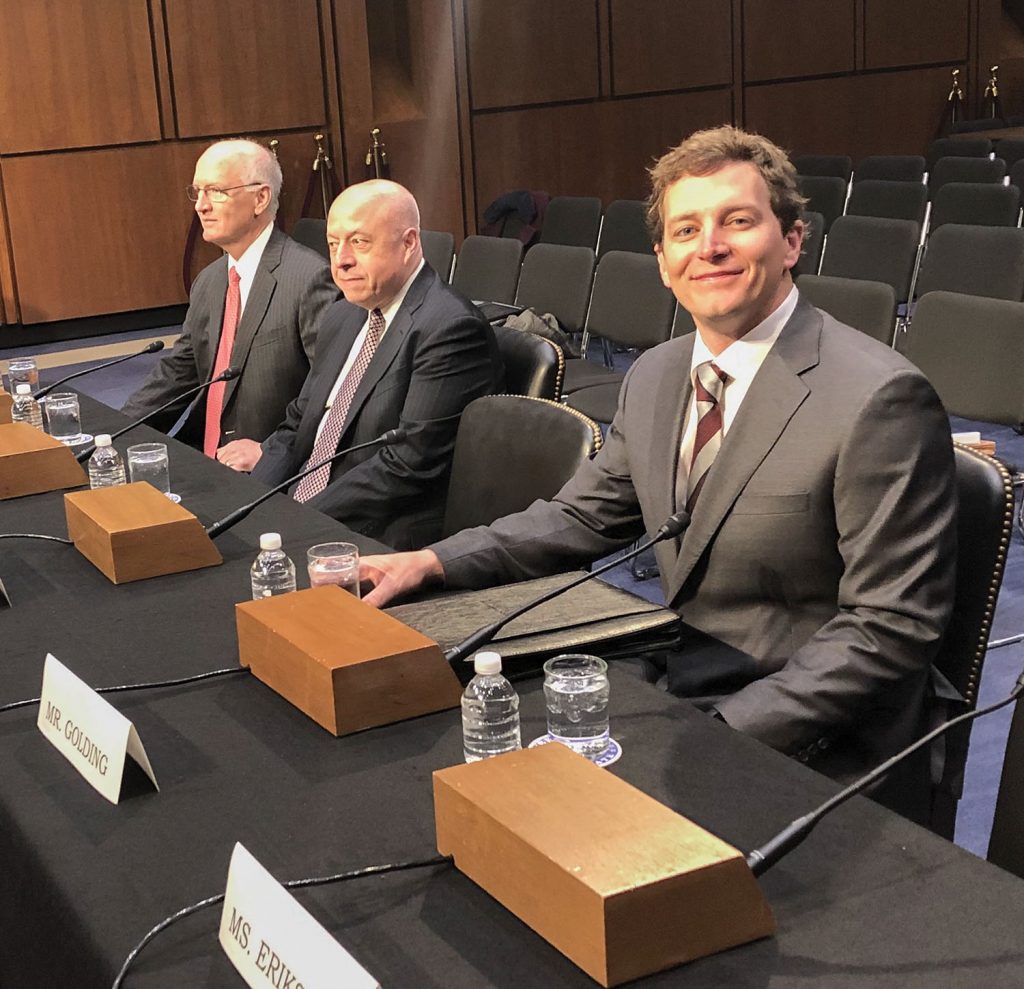Austin Golding Testifies On Maritime Industry Before Senate
Editor’s note: Austin Golding, president of Golding Barge Line, testified March 6 before the U.S. Senate Committee on Commerce, Science and Transportation on the state of the maritime industry. This was his prepared opening statement:
Good morning Chairman Wicker, Ranking Member Cantwell, and members of the committee:

Thank you for the opportunity to come before you and discuss the state of the U.S. maritime industry. My name is Austin Golding, and I am president of Golding Barge Line in Vicksburg, Miss. My family has been involved in the operation of towboats and barges for 54 years. My grandfather and a group of investors entered this industry by starting a shipyard with one boat in 1965. Our family’s current operation includes 24 towboats, 63 barges and over 225 employees and is privately owned in its entirety by my family. We truly are a small family-owned business. My family and our company have navigated the ups and downs of this space that has been at the center of the United States’ ever-growing economy. I am honored to come before the committee today to discuss the state of an industry that returns so much to our country.
Our business, Golding Barge Line, moves refined petroleum and chemical products via tank barge. Our barges serve as inland tank vessels as they move the material that fuels our country. Our voyages take us all along the Gulf Coast from Brownsville, Texas, to Panama City, Fla. They also carry us the length of the Mississippi River as well as the entire Ohio Valley. Our voyages regularly consist of hundreds of miles and transit through multiple states. This is the case with most inland operators regardless of cargo. We rely on an aging system of infrastructure to accomplish these voyages that often link one part of the country with another in a volume of trade that would be impossible to move by another mode of transport. As far as our company specifically, we carry 50,000 to 100,000 barrels of cargo per voyage. That means we are responsible for delivering 2.1 to 4.2 million gallons of product per voyage to someone in a safe and timely manner. We accomplish this with reliable equipment, talented mariners and competent management who all rely on an aging infrastructure system and a regulatory environment that provides certainty.
The American mariner is at the heart of our story. Our business can take a young man or woman and start them as an entry level deckhand earning $30,000 annual salary. Within one to two years they can be promoted to tankerman, which yields a salary of $70,000 a year. If a mariner is particularly talented and dedicated to their craft, they can train to be a pilot and be credentialed as such within five to seven years, sometimes faster. A towboat pilot starts out making $135,000 a year and can make over $200,000 with tenure. Our industry routinely takes young men and women out of high school and develops them into someone earning well over $100,000 a year before they are 30 years old. That is the American dream.
One way that we recruit and develop our entry level positions is a deckhand school that we have developed with our local community college, Hinds Community College. This is a one-week program that simulates life on the boat and what the job will call for. The class itself is held on the campus of Hinds Community College. The students leave their cars behind and are housed in a local hotel. They learn life skills such as cooking and cleaning to go along with basic towboating skills such as working lines and being aware of potential safety issues. Students are enrolled in this program by their employing company after they have passed all of their pre-employment requirements. Passing this class is the final piece of their journey to becoming a real-deal deckhand.
This wonderful program was originally funded via a Trade Adjustment Assistance Community College and Career Training (TAACCCT) Grant through the U.S. Department of Labor. That grant expired in the spring of 2017 and the companies involved, as well as Hinds Community College, kept it going out of their own pockets. Additional funding came through on July 1, 2018, via a Delta Regional Authority grant that originated in the Department of Agriculture. That funding piece expires later this year on June 30. Our company alone has hired 312 graduates of this program since its inception. We have seen improvements in our safety performance, as well as improved entry level retention. Programs like this could be duplicated across the country to introduce more people to this sometimes overlooked and undervalued occupation.
Military veterans have found our industry as a great second career option. When veterans enter our ranks, they understand chain of command, being away from home and working as a team to accomplish a task safely. We take great pride in employing our country’s veterans and offering them a chance to capitalize the skills they developed in the military. Many of these veterans become great leaders on board and find our industry to be a perfect fit.
The Jones Act helps protect these maritime jobs. This critical act ensures that our country will not only have American citizens handling our precious cargo but also that the equipment carrying that cargo will be built in our country by American citizens. The Jones Act is a critical tool in protecting American jobs and national security. Without the Jones Act, I can say with confidence I would not be sitting before you with a great story to tell. Without the Jones Act, this country will be looking for foreign shipyards to build the vessels that protect not only the goods we produce but also our citizens themselves. Our security as a nation is too important to be outsourced around the world. The Jones Act ensures that the United States of America has a robust maritime and shipbuilding talent base. That is something worth protecting.
A point I have touched on is the state of our inland waterway infrastructure. Many of the locks and dams we transit are well beyond their economic design life. Many corners of this country are perilously close to losing their gateway to the world market. Many of the products that move by barge travel through multiple locks before reaching their destination. An investment in a lock in Kentucky may mean products from West Virginia can reach their end market in Texas, Louisiana or abroad.
As a vessel operator, I can attest that many of these structures are in dire need of modernization or replacement. Considering the amount of cargo that is carried along the inland waterways, investments in locks and dams may be the best investment in bulk commerce this country can make. The cargo that passes through one lock may wind up on countless roads or rail lines before meeting its end consumer. An investment in locks and dams needs to happen before this cargo is forced on to our already congested roads, rail and pipelines.
As an industry we want to pay our fair share. Right now companies like ours pay a 29-cents-per-gallon diesel fuel tax. The money we pay goes directly to the Inland Waterways Trust Fund (IWTF). We voluntarily increased that by 45 percent in 2014 from 20 cents to 29 cents because we want to see proper investment in the system. That 29 cents per gallon is the highest gas tax per gallon of any commercial surface transportation mode. We are an active public-private partnership as we speak. Despite this increase and emphasis, our industry still needs more federal support to keep our waterways viable. The incredible scale of the locks and dams, as well as size of the network of which they are a part, requires constant maintenance. The value that these locks and dams bring to our country far exceeds their scale and size.
One of the lesser-known benefits of the inland maritime industry is how green we are. We are able to move cargo with the lowest carbon footprint among other transportation modes to move the same tonnage. We are stewards of the environment in which we operate, as it is nature itself. Roads, rail and airports have not been here for thousands of years as the rivers of this country have. An investment in our inland waterways system not only benefits economic interests but also environmental interests as well. Flood control, municipal water supply and recreation are all positively impacted by investments in our inland waterway system. With bulk cargo volume expected to increase in the future, it only makes sense to ensure the vitality of our maritime industry so it can be the first choice to answer this need.
In closing, I must say it is an honor to come before the committee to discuss these important issues. This industry is a critical thread in the fabric of America. The maritime industry traces its roots back thousands of years due to its unmatched economics. It has been a critical part of the success of the United States and an ever-present component of our country’s prosperity. The inland boat and barge industry has proven itself to be the most efficient, safe and tenured form of cargo transportation in our country but that does not ensure it’s properly prioritized in Washington, D.C. Our industry quietly passes by harbors and city fronts, under bridges and through locks and dams with our country’s precious cargo in tow. Our industry provides many points of light and an endless enduring dream for the American workers, farmers, manufacturers, energy producers and consumers.
Thank you for holding this hearing and allowing our story and priorities to be discussed.


